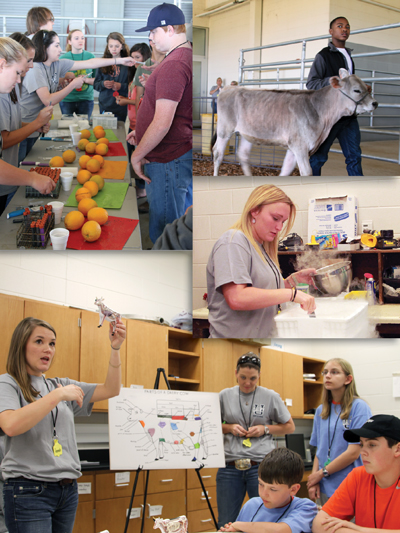Cows Help Students Make Rural Connection At DAIRY U

About 140 students and adults learned lessons about milk rather than math during a course on cows May 2 at Auburn University (AU).
The Alabama Cooperative Extension System, in partnership with the AU Animal Sciences Department, hosted the Dairy Awareness Introductory Resource for Youth, or DAIRY U for short.
Now in its seventh year, the program included adult workshops for the first time this year.
“So many people are removed from the farm today, but this gives them a perspective on how farming impacts them,” said Extension Specialist Boyd Brady, who organized the event. “Three years ago, we let Auburn students help, and my favorite thing is seeing the students come together and put on an outstanding program.”
Noel Fannin, who attended the adult program, said she originally registered for the event because she was curious about starting a farm.
“I have some property, and I’d like to explore the opportunity to farm,” the Dublin, Alabama resident said. “To see the process of how an animal goes from the field to your plate was something I really enjoyed learning more about.”
Participants were broken up into two groups and visited a variety of educational stations during the workshop. Adults learned about common misconceptions of agriculture, types of milk, processing and cattle health. Children made quick-frozen ice cream drops , showed cattle, experienced a milking demonstration and learned about cattle feed, milk content and cattle anatomy.
Reed Golden, 13, said attending DAIRY U gave him the confidence to work on a farm and hit the ground running.
“I don’t live on a farm, but I feel like I got to know the basics of farming and could start from there,” he said. “I would definitely do this next year, and maybe I’ll learn something I didn’t learn this year.”
Jenny Isham, a senior animal science production management major from Bayou La Batre, served as a group leader last year and helped Brady coordinate the event this year. She said DAIRY U helps bridge the urban-rural gap.
“Kids may not go into agriculture—they may be business owners, stay-at-home moms, garbage men or doctors,” she said. “We need all different types of professions to function as a society, but this event helps people understand what farmers do and how hard they work to produce food and fiber for a growing population.”
